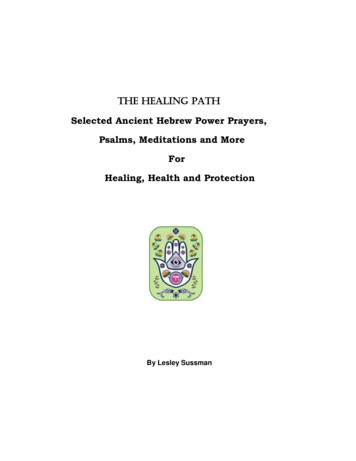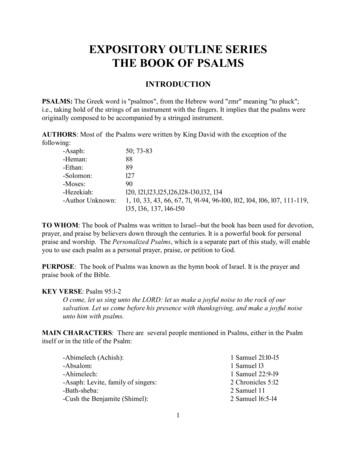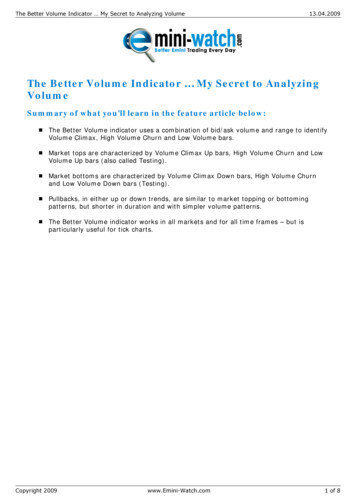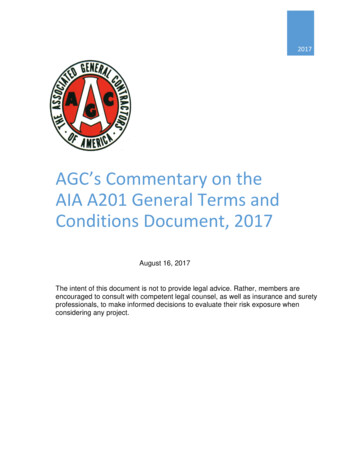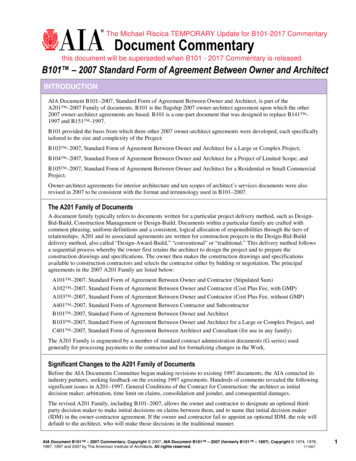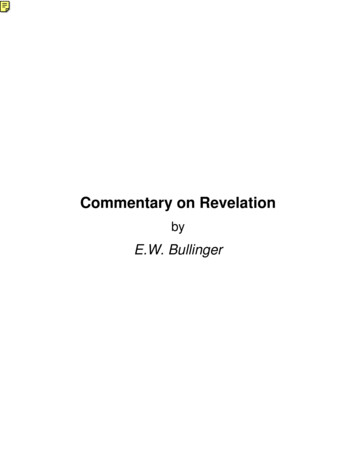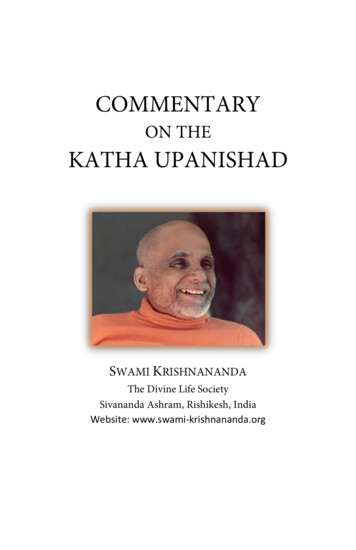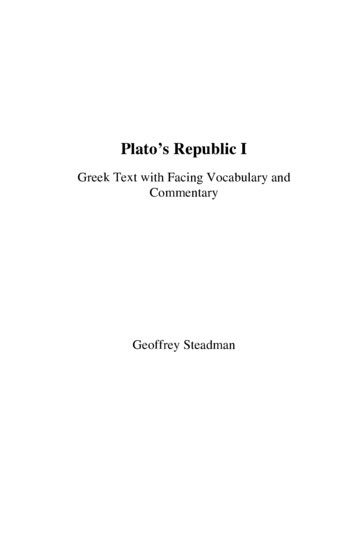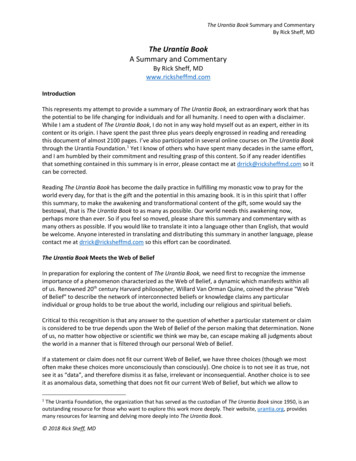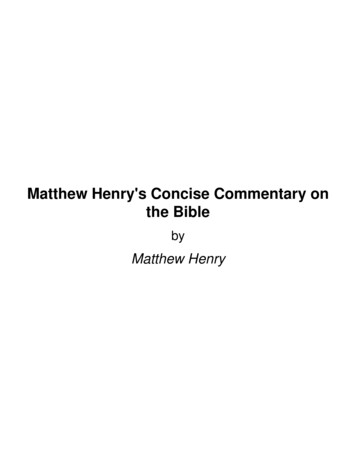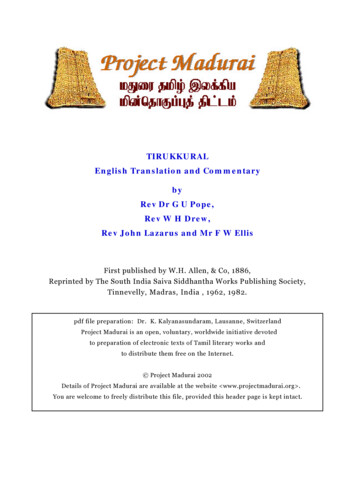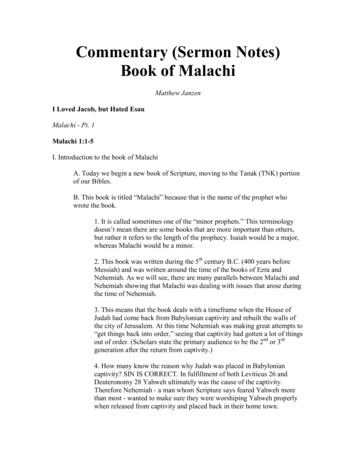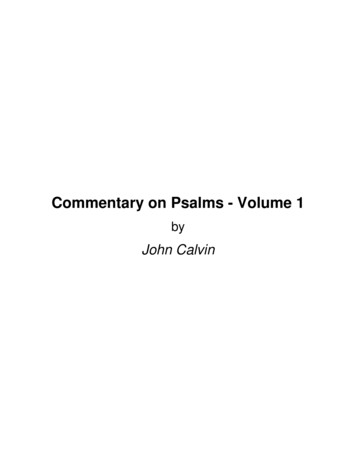
Transcription
Commentary on Psalms - Volume 1byJohn Calvin
THE WRITINGS IN THIS E-BOOK ARE IN THE PUBLIC DOMAINTHEY ARE BEING PRESENTED HERE BYTHE BIBLE TRUTH FORUMhttp://www.bibletruthforum.comAS PART OF OUR BIBLE TRUTH LIBRARY CD
Commentary on Psalms - Volume 1John CalvinTable of ContentsAbout This Book. . . . . . . . . . . . . . . . . . . . . . . . . . . . . . . .Commentary on Psalms 1-35. . . . . . . . . . . . . . . . . . . . . . . .Translator's Preface. . . . . . . . . . . . . . . . . . . . . . . . . . . . . .Facsimile of the Title Page to the 1563 French TranslationCalvin. . . . . . . . . . . . . . . . . . . . . . . . . . . . . . . . . . . . . . .Facsimile of the 1571 English Translation by Arthur Golding. . .Arthur Golding's Epistle Dedicatory. . . . . . . . . . . . . . . . . . . .The Author's Preface. . . . . . . . . . . . . . . . . . . . . . . . . . . . .Psalm 1. . . . . . . . . . . . . . . . . . . . . . . . . . . . . . . . . . . . . .Psalm 1:1-2. . . . . . . . . . . . . . . . . . . . . . . . . . . . . . . . . .Psalm 1:3. . . . . . . . . . . . . . . . . . . . . . . . . . . . . . . . . . .Psalm 1:4. . . . . . . . . . . . . . . . . . . . . . . . . . . . . . . . . . .Psalm 1:5-6. . . . . . . . . . . . . . . . . . . . . . . . . . . . . . . . . .Psalm 2. . . . . . . . . . . . . . . . . . . . . . . . . . . . . . . . . . . . . .Psalm 2:1-3. . . . . . . . . . . . . . . . . . . . . . . . . . . . . . . . . .Psalm 2:4-6. . . . . . . . . . . . . . . . . . . . . . . . . . . . . . . . . .Psalm 2:7-8. . . . . . . . . . . . . . . . . . . . . . . . . . . . . . . . . .Psalm 2:9. . . . . . . . . . . . . . . . . . . . . . . . . . . . . . . . . . .Psalm 2:10-11. . . . . . . . . . . . . . . . . . . . . . . . . . . . . . . .Psalm 2:12. . . . . . . . . . . . . . . . . . . . . . . . . . . . . . . . . .Psalm 3. . . . . . . . . . . . . . . . . . . . . . . . . . . . . . . . . . . . . .Psalm 3:1-2. . . . . . . . . . . . . . . . . . . . . . . . . . . . . . . . . .Psalm 3:3-4. . . . . . . . . . . . . . . . . . . . . . . . . . . . . . . . . .Psalm 3:5-6. . . . . . . . . . . . . . . . . . . . . . . . . . . . . . . . . .Psalm 3:7-8. . . . . . . . . . . . . . . . . . . . . . . . . . . . . . . . . .Psalm 4. . . . . . . . . . . . . . . . . . . . . . . . . . . . . . . . . . . . . .Psalm 4:1. . . . . . . . . . . . . . . . . . . . . . . . . . . . . . . . . . .Psalm 4:2-3. . . . . . . . . . . . . . . . . . . . . . . . . . . . . . . . . .Psalm 4:4-5. . . . . . . . . . . . . . . . . . . . . . . . . . . . . . . . . .Psalm 4:6-7. . . . . . . . . . . . . . . . . . . . . . . . . . . . . . . . . .Psalm 4:8. . . . . . . . . . . . . . . . . . . . . . . . . . . . . . . . . . .Psalm 5. . . . . . . . . . . . . . . . . . . . . . . . . . . . . . . . . . . . . .Psalm 5:1-2. . . . . . . . . . . . . . . . . . . . . . . . . . . . . . . . . .Psalm 5:3. . . . . . . . . . . . . . . . . . . . . . . . . . . . . . . . . . .Psalm 5:4-6. . . . . . . . . . . . . . . . . . . . . . . . . . . . . . . . . .iii. . . . . . p. ii. . . . . . p. 1. . . . . . p. 2by John. . . . . . p. 11. . . . . . p. 12. . . . . . p. 13. . . . . . p. 19. . . . . . p. 27. . . . . . p. 27. . . . . . p. 29. . . . . . p. 30. . . . . . p. 30. . . . . . p. 32. . . . . . p. 32. . . . . . p. 34. . . . . . p. 36. . . . . . p. 38. . . . . . p. 39. . . . . . p. 40. . . . . . p. 43. . . . . . p. 43. . . . . . p. 45. . . . . . p. 46. . . . . . p. 47. . . . . . p. 49. . . . . . p. 49. . . . . . p. 51. . . . . . p. 53. . . . . . p. 54. . . . . . p. 56. . . . . . p. 58. . . . . . p. 58. . . . . . p. 59. . . . . . p. 60
Commentary on Psalms - Volume 1Psalm 5:7. . . . .Psalm 5:8-10. . .Psalm 5:11-12. .Psalm 6. . . . . . . .Psalm 6:1. . . . .Psalm 6:2-3. . . .Psalm 6:4-5. . . .Psalm 6:6-7. . . .Psalm 6:8-10. . .Psalm 7. . . . . . . .Psalm 7:1-2. . . .Psalm 7:3-5. . . .Psalm 7:6-8. . . .Psalm 7:9-11. . .Psalm 7:12-14. .Psalm 7:15-16. .Psalm 8. . . . . . . .Psalm 8:1. . . . .Psalm 8:2. . . . .Psalm 8:3-4. . . .Psalm 8:5-6. . . .Psalm 8:7-9. . . .Psalm 9. . . . . . . .Psalm 9:1-3. . . .Psalm 9:4-5. . . .Psalm 9:6-8. . . .Psalm 9:9-12. . .Psalm 9:13-14. .Psalm 9:15-16. .Psalm 9:17-18. .Psalm 9:19-20. .Psalm 10. . . . . . .Psalm 10:1-2. . .Psalm 10:3-4. . .Psalm 10:5-6. . .Psalm 10:7-10. .Psalm 10:11-13.Psalm 10:14-15.Psalm 10:16-18.Psalm 11. . . . . . .John Calvin.iv.p. 61p. 62p. 64p. 67p. 67p. 68p. 70p. 71p. 72p. 74p. 74p. 75p. 77p. 79p. 81p. 83p. 85p. 85p. 86p. 88p. 90p. 93p. 95p. 95p. 97p. 98p. 100p. 104p. 105p. 106p. 107p. 110p. 110p. 112p. 114p. 116p. 118p. 120p. 122p. 125
Commentary on Psalms - Volume 1Psalm 11:1-3. . .Psalm 11:4-5. . .Psalm 11:6-7. . .Psalm 12. . . . . . .Psalm 12:1-2. . .Psalm 12:3-4. . .Psalm 12:5-6. . .Psalm 12:7-8. . .Psalm 13. . . . . . .Psalm 13:1-2. . .Psalm 13:3-4. . .Psalm 13:5. . . .Psalm 14. . . . . . .Psalm 14:1. . . .Psalm 14:2-3. . .Psalm 14:4. . . .Psalm 14:5-6. . .Psalm 14:7. . . .Psalm 15. . . . . . .Psalm 15:1-2. . .Psalm 15:3. . . .Psalm 15:4. . . .Psalm 15:5. . . .Psalm 16. . . . . . .Psalm 16:1. . . .Psalm 16:2-3. . .Psalm 16:4. . . .Psalm 16:5-6. . .Psalm 16:7. . . .Psalm 16:8-9. . .Psalm 16:10. . . .Psalm 16:11. . . .Psalm 17. . . . . . .Psalm 17:1-2. . .Psalm 17:3-4. . .Psalm 17:5-6. . .Psalm 17:7-9. . .Psalm 17:10-12.Psalm 17:13-14.Psalm 17:15. . . .John Calvin.v.p. 125p. 128p. 129p. 132p. 132p. 133p. 134p. 137p. 139p. 139p. 140p. 141p. 144p. 144p. 146p. 148p. 149p. 151p. 153p. 153p. 155p. 155p. 158p. 161p. 161p. 161p. 163p. 166p. 168p. 168p. 170p. 172p. 173p. 173p. 174p. 177p. 178p. 180p. 181p. 184
Commentary on Psalms - Volume 1Psalm 18. . . . . . .Psalm 18:1-2. . .Psalm 18:3-6. . .Psalm 18:7-11. .Psalm 18:12-19.Psalm 18:20-24.Psalm 18:25-27.Psalm 18:28-32.Psalm 18:33-36.Psalm 18:37-40.Psalm 18:41-45.Psalm 18:46-50.Psalm 19. . . . . . .Psalm 19:1-6. . .Psalm 19:7-9. . .Psalm 19:10-11.Psalm 19:12-14.Psalm 20. . . . . . .Psalm 20:1-2. . .Psalm 20:3-5. . .Psalm 20:6-9. . .Psalm 21. . . . . . .Psalm 21:1-3. . .Psalm 21:4-6. . .Psalm 21:7-10. .Psalm 21:11-13.Psalm 22. . . . . . .Psalm 22:1-2. . .Psalm 22:3-8. . .Psalm 22:9-11. .Psalm 22:12-16.Psalm 22:17-21.Psalm 22:22-24.Psalm 22:25-29.Psalm 22:30-31.Psalm 23. . . . . . .Psalm 23:1-4. . .Psalm 23:5-6. . .Psalm 24. . . . . . .Psalm 24:1-4. . .John Calvin.vi.p. 186p. 187p. 189p. 192p. 195p. 198p. 202p. 204p. 206p. 207p. 209p. 212p. 216p. 216p. 221p. 225p. 227p. 231p. 231p. 232p. 234p. 237p. 237p. 239p. 240p. 243p. 245p. 245p. 248p. 252p. 253p. 256p. 257p. 259p. 263p. 265p. 265p. 268p. 271p. 271
Commentary on Psalms - Volume 1Psalm 24:5-6. . .Psalm 24:7-10. .Psalm 25. . . . . . .Psalm 25:1-3. . .Psalm 25:4-7. . .Psalm 25:8-11. .Psalm 25:12-15.Psalm 25:16-22.Psalm 26. . . . . . .Psalm 26:1-4. . .Psalm 26:5-7. . .Psalm 26:8-11. .Psalm 26:12. . . .Psalm 27. . . . . . .Psalm 27:1-3. . .Psalm 27:4-6. . .Psalm 27:7-9. . .Psalm 27:10-12.Psalm 27:13-14.Psalm 28. . . . . . .Psalm 28:1-2. . .Psalm 28:3-5. . .Psalm 28:6-8. . .Psalm 28:9. . . .Psalm 29. . . . . . .Psalm 29:1-4. . .Psalm 29:5-8. . .Psalm 29:9-11. .Psalm 30. . . . . . .Psalm 30:1-3. . .Psalm 30:4-5. . .Psalm 30:6-10. .Psalm 30:11-12.Psalm 31. . . . . . .Psalm 31:1-4. . .Psalm 31:5-8. . .Psalm 31:9-13. .Psalm 31:14-18.Psalm 31:19-21.Psalm 31:22-24.John Calvin.vii.p. 274p. 276p. 279p. 279p. 280p. 283p. 286p. 289p. 293p. 293p. 296p. 298p. 300p. 301p. 301p. 303p. 305p. 306p. 308p. 311p. 311p. 312p. 315p. 316p. 317p. 317p. 319p. 320p. 323p. 324p. 324p. 327p. 330p. 332p. 332p. 334p. 337p. 339p. 341p. 343
Commentary on Psalms - Volume 1Psalm 32. . . . . . . . . . . . . . . . .Psalm 32:1-2. . . . . . . . . . . . .Psalm 32:3-4. . . . . . . . . . . . .Psalm 32:5-7. . . . . . . . . . . . .Psalm 32:8-11. . . . . . . . . . . .Psalm 33. . . . . . . . . . . . . . . . .Psalm 33:1-4. . . . . . . . . . . . .Psalm 33:5-9. . . . . . . . . . . . .Psalm 33:10-12. . . . . . . . . . .Psalm 33:13-17. . . . . . . . . . .Psalm 33:18-19. . . . . . . . . . .Psalm 33:20-22. . . . . . . . . . .Psalm 34. . . . . . . . . . . . . . . . .Psalm 34:1-6. . . . . . . . . . . . .Psalm 34:7-10. . . . . . . . . . . .Psalm 34:11-14. . . . . . . . . . .Psalm 15-17. . . . . . . . . . . . . .Psalm 34:18-22. . . . . . . . . . .Psalm 35. . . . . . . . . . . . . . . . .Psalm 35:1-3. . . . . . . . . . . . .Psalm 35:4-7. . . . . . . . . . . . .Psalm 35:8-10. . . . . . . . . . . .Psalm 35:11-15. . . . . . . . . . .Psalm 35:16-18. . . . . . . . . . .Psalm 35:19-23. . . . . . . . . . .Psalm 35:24-28. . . . . . . . . . .Translation of Psalms 1-35. . . . .Indexes. . . . . . . . . . . . . . . . . .Index of Scripture References. .Index of Scripture Commentary.Greek Words and Phrases. . . .Hebrew Words and Phrases. . .Latin Words and Phrases. . . . .French Words and Phrases. . . .John Calvin.viii.p. 346p. 346p. 349p. 351p. 353p. 356p. 356p. 358p. 360p. 362p. 364p. 365p. 367p. 368p. 371p. 373p. 375p. 376p. 378p. 378p. 380p. 381p. 383p. 386p. 388p. 389p. 392p. 393p. 393p. 395p. 396p. 397p. 404p. 405
Comm on Psalms (V1)John CalvinCOMMENTARYONTHE BOOK OF PSALMSBY JOHN CALVINTRANSLATED FROM THE ORIGINAL LATIN, AND COLLATEDWITH THE AUTHOR'S FRENCH VERSION,BY THE REV. JAMES ANDERSONVOLUME FIRSTCHRISTIAN CLASSICS ETHEREAL LIBRARYGRAND RAPIDS, MIhttp://www.ccel.org
Comm on Psalms (V1)John CalvinINTRODUCTORY NOTICEThe Book Of Psalms, viewed merely as a poetical composition, has very high claims on ourattention. Men of the most refined and cultivated taste have often been attracted to the study of itfrom the poetical beauties with which it abounds, and have admitted, in this respect, the superiorityof its claims. The greatest of our English poets 1 thus speaks of these sacred songs: ”Not in theirdivine argument alone, but in the very critical art of composition, they may be easily made appearover all the kinds of lyric poesy to be incomparable.” Another elegant scholar 2 speaking on thesame subject, says, “In lyric flow and fire, in crushing force and majesty, that seems still to echothe awful sounds once heard beneath the thunder clouds of Sinai, the poetry of the ancient Scripturesis the most superb that ever burned within the breast of man.”But the intrinsic excellence of this Book gives it still higher claims on our attention. writtenunder the influence of the Spirit of inspiration, its subject-matter is worthy of its celestial origin.In general, it contains details of the national history of the Jewish people, records of particularportions of the life and experience of individuals, and predictions of future events. Each of theseheads embraces a wide field, and they include illustrations of every religions truth which it isnecessary for us to know, exemplifications of every devout feeling which it is our duty to cherish,and examples of every spiritual conflict which it is possible for us to experience. We meet withmany disclosures of the greatness, majesty, and perfections of the only true God; his governmentof the world; and his special care over his chosen people. We meet with the varied exercises of theregenerated soul, and behold it at one time offering up fervent supplications to the Hearer of prayer,at another celebrating his perfections and works; at one time giving utterance to the ardent breathingsof love to God, and trust in him, at another struggling with unbelief and corruption; at one timemourning under the divine chastisement on account of sin, at another rejoicing in a sense of forgivingmercy, and enjoying the peace which passeth all understanding. We have presented to us manywonderful predictions concerning the Messiah, his humiliation, sufferings, death, resurrection, andascension to his Fatherright hand; his work in heaven as the intercessor of his people, and hisauthority as universal King; the effusion of the influences of the Holy Spirit, and the conversionof all nations to the faith of the Gospel. In short, we have unfolded to our view the final judgment,the gathering of all the righteous to God, and the eternal exclusion of the wicked from happinessand from hope.These and similar topics which are set forth in the noblest strains of poetry, and in a dictionwhose magnificence and sublimity correspond to the importance and grandeur of the sentiments,constitute the materials of this Book; and while they afford an incontestable proof that it Is inspired,that it does not consist of the creations of mere human genius, but is an emanation from heaven,they show that its character and tendency are altogether different from the character and tendencyof the most admired poetry, which the genius of heathen nations has ever produced. It ministers tono depraved passion; it fosters no fictitious virtue; it disdains to offer its delicious incense at theshrine of degrading superstition. It teaches the most exalted piety, and the purest morality. It tendsonly to refine and exalt the nature of man, to elevate the soul to God, and inspire it with theadmiration and love of his character, to curb the passions, purify the affections, and excite to the12MiltonSir David K. Sandford2
Comm on Psalms (V1)John Calvincultivation of whatsoever things are true, honest, just, pure, lovely, and of good report. It has guidedthe saint in doubt and difficulty; it has nerved him for self-denial and suffering; it has impartedsupport and comfort to him in the hour of death. This Book has accordingly been highly appreciatedby the best of men in every age, and they have labored to find expressions in which to set forth itsexcellence. Athanasius styles it, “An epitome of the whole Scriptures;” Basil, “A compendium ofall theology;” Luther, “A little Bible, and the summary of the Old Testament;” Melancthon, “Themost elegant work extant in the world;” and for Calvin’s estimate of its value we refer to theexcellent preface with which he introduces this department of his labors to the attention of thereader.Calvin’s Commentary On The Psalms, a new Translation of which is now in course of beingpresented to the English reader, is distinguished by many of the excellencies which have acquiredfor his Commentaries on other parts of Scripture so great reputation. In this, as in his otherCommentaries, his first and great object is to ascertain the mind of the Holy Spirit. To ascertainthis, he proceeds on the principle laid down by Melancthon, “that Scripture cannot be understoodtheologically, unless it be first understood grammatically.” Before his time the mystical andallegorical method of explaining the Scriptures was very prevalent; according to which, theinterpreter, dwelling very little or not at all upon the literal sense, sought for hidden and allegoricalmeanings. But rejecting this mode of interpretation, which contributed little to the right understandingof the word of God, and according to which the meaning was made to depend entirely upon thefancy of the interpreter, Calvin set himself to the investigation of the grammatical and literal sense,by a careful examination of the Hebrew test, and by a diligent attention to the drift and intentionof the writer’s discourse.This principle of interpretation cannot be too highly commended. It should first engage theattention of the commentator; and when it is neglected, the fundamental principle of sacred criticismis violated. Calvin was deeply alive to its importance. His only defect lies in his acting upon it tooexclusively. Many of the Psalms, in addition to the literal meaning, have a prophetical, evangelical,and spiritual sense. While referring primarily to David and the nation of Israel, they have, at thesame time, a reference to Christ and the New Testament Church, founded on the fact that the formerwere typical of the latter. Calvin, indeed, explains some of the Psalms on this principle. But heapplies the principle less frequently than he might have done, without contravening the canons ofsound hermeneutics. His great aversion to the mystical method of interpretation, and to the absurdand extravagant lengths to which it was carried by the Fathers, perhaps made him err on the otherextreme of confining his attention too much to the literal meanings and directing his attention toolittle to the prophetical and spiritual character of the Book, and to the reference which it has toChrist and the Church. In consequence of this, his expositions have less unction, and contain lessof rich evangelical sentiment, than would otherwise have distinguished them. There are, however,two principles of evangelical truth which he is at pains to inculcates whenever a fit opportunitypresents itself —the doctrine of justification by faith in Christ without the works of the Law; andthe necessity of personal holiness in order to salvation.Another excellence of this commentary is its practical character. The author does not confinehimself to the dry and lifeless detail of mere grammatical praxis, as if he had been commenting ona Greek or Roman classic. He turns all his explanations to practical account, and thus his workexhibits a happy combination of critical and philological remark with practical exposition.3
Comm on Psalms (V1)John CalvinHere, again, we find displayed the sound and penetrating judgment for which Calvin has beenuniversally admired. This is manifest in the judicious selection which he makes from amongst avariety of interpretations of that which is evidently the true one, or which appears to be the mostprobable. Sometimes he pronounces a certain interpretation to be meagre and unsatisfactory. Atother times, he simply states hit preference of one interpretation to another, when, after carefulexaminations it appeared to him to have the balance of arguments in its favor; without, however,expressing any decided opposition to the other, when the view which he preferred to it was supportedonly bit a slight preponderance of evidence. At other times, he does not decide between differentinterpretations, showing that with respect to certain words and expressions he had not come to afixed opinion. In all these instances, 3 he generally shows much penetration and judgment. He is,no doubt, sometimes mistaken in his interpretation of particular passages. But when it is consideredthat the Scriptures had long been a sealed book, and that his helps were few and imperfect comparedwith those which we now possess, the wonder is, that he should have succeeded so well in bringingout their true meaning. This was chiefly owing to vigor and acuteness of intellects combined witha sound and discriminating judgment. These, indeed, were the mental qualities by which he waspeculiarly distinguished. We meet with no flashes of poetry, no brilliant coruscation of fancy, givingevidence of a powerful imagination. The eloquent passages which occur are the eloquence of reason,3From the variety of interpretations of the same passages which we meet with in Calvin’s Commentary, and of which wehave still more numerous specimens in Poole’s Synopsis Criticorum, it is by no means to be supposed that the meaning of thelanguage of Scripture is vague, uncertain, and unsettled. Had the professed interpreters of Scripture always performed their taskwith judgment, as well as learning and talent, and been guided by the rules of sound hermeneutics, the reader would not havebeen bewildered with so many different and contradictory interpretations. Still, however, there are words and sentences, theexact import of which is more or less doubtful and uncertain, so that it is difficult to determine between different senses whichhave been put upon them. The reasons of this are so well stated by Cresswell, in his preface to The Book of Psalms with Notes,(pp. 14, 15, 16,) and the passage has so direct a bearing on a number of the various interpretations, which Calvin deals with inthis Commentary, that we shall quote it entire though it is long.“The Hebrew is not only a dead language, but the oldest of all dead languages; it is, moreover, the language of a peoplethat lived under institutions and in a climate very different from those of our own country, so that the idioms with which itabounds cannot but be strange to our habits of thinking and our modes of speech; nor have we any book but the Bible itself toconsult for an illustration of these phraseological peculiarities. The paucity of the words also contained in that ancient tongue issuch, that the same Hebrew term very often bears a great variety of significations, the connection of which with each other cannotalways be satisfactorily ascertained: and, again, there are words, each of which is found but once in the whole volume of Scripture,so that their meanings can only be conjectured, either from their affinity to other words, or from the purport of the passagewherein they occur.”“The following are amongst the many grammatical Hebraisms which we meet with in The Book of Psalms. The future andpast tenses are put almost indiscriminately, the one for the other, and the former of them is used occasionally to designate notthat which will happen, but that which is accustomed to happen. The infinitive is put for every other mood, and also for nounseven in the accusative case. The future tense is sometimes expressed by a verb in the imperative mood. Two substantives areput instead of a substantive and an adjective; a substantive is frequently used adverbially; and the same substantive repeateddenotes multitude When the negative particle occurs in the first member of a sentence, it is sometimes to be understood, andmust be supplied, in the following members. Hebrew sentences are also in other respects very often elliptical, broken, andimperfect; and in the same sentence there is in many instances a change of person in the speaker, without any express intimationof it.”“From the peculiarities above mentioned, and especially from the different ways in which an ellipse may be supplied, it isplain that the text of Scripture must needs admit of a considerable latitude of interpretation; so that although none of its importantdoctrines whether they relate to faith or morals, are thereby left doubtful, yet does it contain passages the exact meanings ofwhich are more or less uncertain. The candid and pious reader, however, will with Augustine gladly acknowledge that all whichhe fully comprehends in the sacred volume is most excellent; whilst he looks with feelings of veneration upon that smaller portionof it which he less perfectly understands, but which the diligence and erudition of future times may, through divine aid, beenabled to elucidate.”4
Comm on Psalms (V1)John Calvinnot the bursts of imagination. But his strength of thought, the vigor and perspicacity of his intellect,the extraordinary power of his judgment, command our willing admiration.Since this commentary was first published, a great number of Translations of The Psalms, aswell as numerous critical and explanatory works upon them, have made their appearance, whilemuch new light has been thrown upon many passages from more extensive philological research,from an attention to the parallelism of Hebrew poetry, 4 and from the fuller information which wenow possess, by the discoveries of modern travelers, of the natural history, customs, and manneredof the East, to which frequent allusion is made in The Psalms. But such id the acuteness of judgment,and success in discovering the mind of the Spirit which distinguish these prelections, that the
Commentary on Psalms - Volume 1 by John Calvin. This document has been generated from XSL (E
